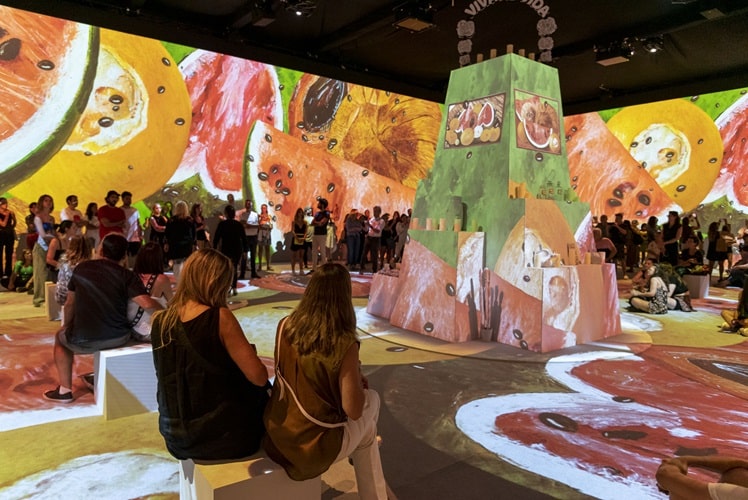In a continually evolving world where technological possibilities seem endless, attracting the public’s attention has become a challenge. Faced with the saturation of traditional forms of participation, the transformative potential of immersive experiences has been adopted as a fundamental element in entertainment and even in consumption. Whether used as part of large-scale or more intimate events, in museum projects or as an essential marketing component, these experiences have the extraordinary capacity to transcend the limits of technology and bring people together to experience unique moments.
It is essential to understand and support the importance of these experiences in the development of events, museums and exhibitions. When carefully developed and designed, they foster unique connections between people through unforgettable moments that awaken their senses, even motivating them to build a collective awareness of their actions. Unlike traditional events or more static experiences at museums and cultural centres, visitors become active participants rather than mere spectators thanks to these new environments.
In her book Hamlet from the Holodeck (1997), digital media professor Janet Murray describes immersion as the “sensation of being surrounded by a completely different reality, as different as water is from air.” This analogy perfectly describes the transformative nature of immersive experiences, which transport us beyond our environment, highlighting the profound shift in perception and engagement when we move thoroughly into a simulated reality or fictional world. And while sensory elements and interactive and immersive technologies are key resources for developing this type of experience, the narrative ultimately creates the experience. Without a good story, we can never achieve a unique immersive experience.
Both narrative and technology are combined at Jurassic Sea, one of our latest projects presented in Spain, located at what is currently the largest palaeontological park in Europe. This immersive experience generates an illusion of a “time” and a “place” to transport visitors to the Palaeozoic and Mesozoic Eras. Jurassic Sea recreates a multi-sensory marine adventure set in the dawn of time through 3D projections, audiovisual and interactive resources, museographic elements, and artificial intelligence. To enhance the sense of immersion, this project does not include signs or graphics, which would hinder the realism of the experience. The absence of these components promotes the free and active circulation of visitors, who can move intuitively through the rooms, interacting with all the elements that attract their attention. This is the case of hyperrealistic replicas that entice visitors to experiment and learn, using other senses that have no place in traditional museum settings, such as touch.
In the case of Terra, the majestic Sustainability Pavilion at Expo Dubai 2020, a space over 10,000 m2 created by architect Nicholas Grimshaw, where we were responsible for the technical development, production, technical operation, and maintenance of the exhibition area, the immersive experience aimed to promote a sense of collective responsibility towards the planet. In an exciting journey around the earth, visitors were invited to interact with the exhibition, multimedia, and interactive resources and understand that every action affects the environment.
“Experience Economy”
In a post-pandemic and digital society, amid the instability caused by a new war in Europe, people want to enjoy intense and memorable adventures through these experiences while they consume.
In recent years, the high diffusion of immersive experiences and the increasingly widespread use of technological and narrative resources in retail has led to the creation of the World Experience Summit, held for the first time in London last June. This three-day on-site meeting brought together pioneers and experts from different sectors of the so-called “experience economy”, that is, the economy that seeks to make the consumption of certain products or the use of specific services memorable for customers. According to the World Experience Organization (WXO), the institution behind this first meeting, the value of the “experience economy” is expected to reach 12 trillion dollars by 2028, driven by the public and consumers, who place increasing value on the pursuit of meaningful experiences over the accumulation of material goods.
What about the future?
Technology plays a clear role in the foreseeable future of immersive experiences. In the not-too-distant future, artificial intelligence (AI), virtual reality (VR), augmented reality (AR), and real-time visualization engines will come together. However, technology is merely an empty tool without a story to justify its use. “Narrative art and storytelling stirs our emotions, shapes our aspirations as a society, and is the glue that binds us together around our common beliefs,” stated George Lucas in 2018 at the unveiling of the Museum of Narrative Art in Los Angeles.
It is becoming increasingly clear that the more tied we are to technology, the more disconnected we tend to feel as a society. For this reason, the stories and narratives we can create on an experiential level should help us to seek change as individuals, translating into social transformation. In fact, certain authors, such as Joseph Pine II, already refer to the ‘transformation economy’ as the stage above the experience economy in which services and products must be able to bring about an inner change in consumers.
From this perspective, the path of immersive experiences is still long, and the creators of such experiences have a huge responsibility: it is no longer enough to generate memorable experiences; instead, they must arouse an authentic personal transformation in individuals that, if possible, fosters empathy and leads to a more prosperous society.




